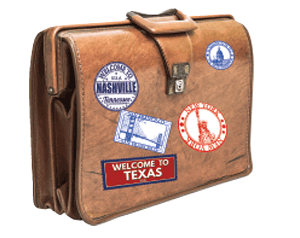Partnership makes practice easier for lawyers who have military spouses

Photo Illustration by J.Manzo
Elizabeth Jamison knows how hard it is to be a lawyer married to someone in the military—to move from state to state while also building a legal practice.
Jamison’s husband’s job as a helicopter pilot in the Navy has taken them from California to Florida to Rhode Island and now Washington, D.C. Over the course of four years, it’s left the family law attorney looking for creative ways to stay working.
“I relied mostly on contracting out to other attorneys because I wasn’t confident in my ability to connect with clients in San Diego while working remotely,” Jamison says.
Jamison is president-elect of the Military Spouse JD Network—a group with about 1,200 members who are lawyers married to members of the military. A big part of her job is to make it easier for the group’s members to keep being lawyers, under challenging circumstances.
For example, the MSJDN has worked with state bar associations to create rules that allow military spouses to temporarily practice law without taking that state’s bar exam. As of Sept. 15, 20 states had such rules in place, Kansas being the latest.
Now, the network has begun a partnership with online lawyer matchmaker Legal Services Link that could be just the solution its constituents need.
Legal Services Link is a platform that will seem familiar to anyone who’s used Thumbtack or TaskRabbit to find a handyman or a plumber. The site lets potential clients post their legal needs—what sort of help they seek, where they’re located and how much that they hope to spend. Then the lawyers who have paid to register with Legal Services Link can respond, offering their services. Legal Services Link also provides attorneys free listings in its lawyer directory.
Co-founder Matthew Horn says Legal Services Link’s aim is to help more people get more legal assistance while also giving lawyers a new tool to build a client base and maintain their practices. The site was founded in 2015 and has about 400 lawyers signed up so far. Horn says about 300 legal projects have been posted, with business mostly centered in and around Chicago.
“Fortunately, the old dating saying ‘There’s someone out there for everyone’ is equally as true in the legal industry—there’s an attorney out there for everyone,” he says. “The problem now is that they can’t find one another. We intend to change that.”
Horn met MSJDN representatives at the National Conference of Bar Presidents midyear meeting in February, realized they had extremely compatible interests, and set about finding a way to work together.
A partnership now is in its infant stages. Both sides hope the arrangement will be a boon to all, with network members receiving discounted premium services and Legal Services Link gaining access to more than a thousand transient attorneys who are trying to stay active in a profession that heavily favors staying in one place.
“The adoption of technology by both clients and attorneys is making it easier for mobile populations like our members to maintain a career,” Jamison says. “I wish I would have had Legal Services Link when I was hanging my own shingle.”
This article originally appeared in the November 2016 issue of the ABA Journal with this headline: “A Boost for Transient Attorneys: Partnership makes practice easier for lawyers who have military spouses.”



